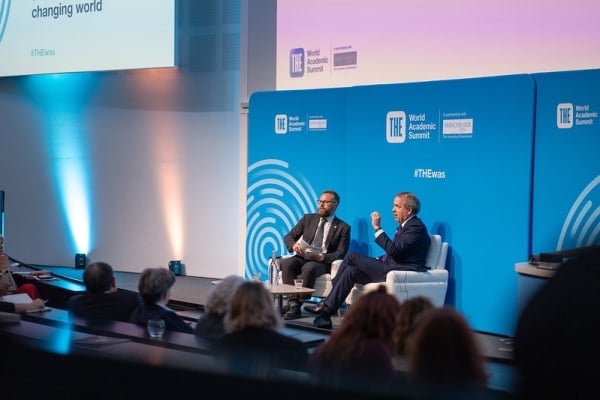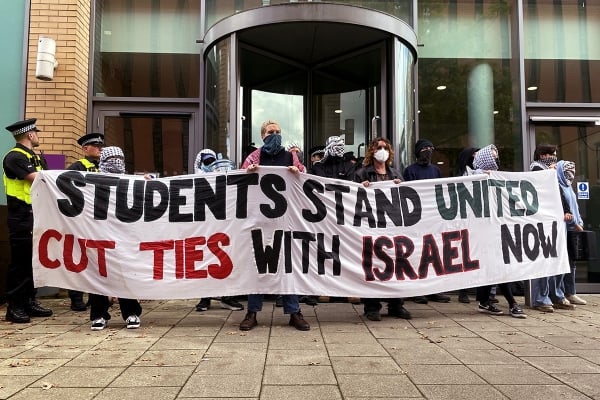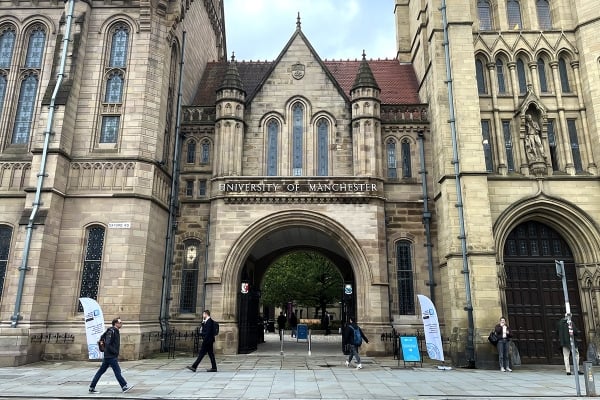MANCHESTER, U.K.—Spread across three days, the World Academic Summit drew global leaders from far and wide to discuss the complexities of higher education in a changing world.
The event, put on by Times Higher Education (Inside Higher Ed’s parent company), featured more than 40 sessions on a wide range of issues including business challenges, global partnerships and research innovation. Based on observations from various panel sessions and conversations with academic leaders, CEOs and students, it’s clear that despite geographic differences, institutions around the world are grappling with similar challenges.
Shaky Business Models
While many U.S. institutions are reeling from financial challenges due to declining enrollment, a Tuesday panel comprised of leaders from Canada, England and Japan noted that pressures on university business models are widespread and often driven by factors outside their control.
Bill Flanagan, president of the University of Alberta, said that shortly after he stepped into his role in 2020, his institution was hit with steep funding cuts from the provincial government. Flanagan had to scramble to find roughly $84 million (in U.S. dollars) worth of cost savings.
The university was forced to restructure, he said, making cuts over a period of two years in a process that emphasized the retention of faculty and academic staff jobs. But given the depth of the challenge, “there was no service at the university that was not touched,” he said.
He also cited the impact of the loss of international students, now that Canada has restricted the number it is allowing into the country. Flanagan suggested that “Ottawa [the capital] is doing everything it can to drive away” such students, a matter he chalked up to political tensions over migration and housing shortages in Canada. Those bitter conversations, he said, will ultimately harm higher ed’s bottom line.
While raising tuition is one option to offset financial issues (and a lever the University of Alberta pulled), it comes with its own challenges.
At the University of Tokyo, a roughly $654-a-year tuition hike for undergraduate programs was met with student protests and media scrutiny when it was announced this fall, executive director and vice president Kunihiro Ohta said.
Global South’s Growing Influence
Does the future of international partnerships lie in the Global South? Duncan Ivison, president and vice chancellor of the University of Manchester, which hosted the summit, believes so.
In a main-stage interview on Monday, Ivison said the next wave of entrepreneurs and scientists will likely hail from Africa and Southeast Asia, noting that they are navigating global challenges “with a fraction of the resources” that Western nations have to respond to crises.
Because of such innovation and resilience, Ivison said, he is eyeing partnerships in Africa and the Middle East.
“My hunch is that we’re going to learn more from engaging with the global universities of the South, frankly, than we will … by signing yet another agreement with Harvard or MIT,” he said.
Ivison also expressed concern that governments may take what he cast as shortsighted positions on collaborative partnerships with institutions in countries that have been historically antagonistic or in competition with one another, arguing that universities needed to have a “long view.”
In a panel discussion on Tuesday, European research leaders discussed the future of the bloc’s influence as a research superpower. Evelyn Welch, the president and vice chancellor at the University of Bristol, mentioned the institution’s partnership with the University of South Africa to coordinate the African Charter, a coalition of signatories across the continent and Europe, North and South America that aims to create equitable research partnerships with institutions in the Global South.
Imposing a medical model of a university is “problematic for new or young higher education sectors,” Welch said. “We should be open to the challenge of finding new ways to do research and teaching. Saying everyone should occupy the same space as Paris in the 14th century isn’t right.”

Campus Tensions Have No Borders
Campuses across the world have been roiled by pro-Palestinian protests, and Manchester’s was no different. The first sessions hadn’t even begun Monday when protesters blocked access to the event’s registration, holding a banner that read, “1 year of Gaza Genocide” and “Israel out of academia.” They also disrupted a main-stage conversation with U.K. Department of Education skills minister Jacqui Smith and demonstrated outside receptions and other gatherings of conference attendees.
The first day of the conference, Monday, Oct. 7, marked the one-year anniversary of Hamas’s attack on Israel.
With dozens of universities from more than 30 countries in attendance, pro-Palestinian protesters saw an opportunity to address multiple institutions, one student told Inside Higher Ed.
Police officers fell to the ground in a tussle with protesters on the first day, but the scene ended without arrests. In one instance, students were allowed roughly 10 minutes to speak before being removed by campus security.
Some attendees told Inside Higher Ed the tolerance for protests was a function of British academia, with demonstrators being given time to make their points before being removed.

Students briefly blocked access to a venue where the World Academic Summit was being held on Tuesday.
Josh Moody/Inside Higher Ed
Some attendees were visibly frustrated, while others voiced their support for the protesters.
“What’s happening in Gaza is atrocious,” Tyrone Pretorious, rector and vice chancellor of the University of the Western Cape in South Africa, told Inside Higher Ed as he observed a protest.
Numerous speakers also referenced the protests during speeches and panels, often highlighting the importance of engaging in hard conversations as a foundational tenet of academia.
“It is a very difficult day in our community for many people,” Ivison, the Manchester vice chancellor, said at one session. “The intensification of the conflict in the Middle East has impacted thousands, not only in the Middle East, but in our city and in our country. So I just wanted to acknowledge that the pain and suffering that’s been felt by all sorts of members of our community is real. We all, I think, hope for peace.”
Ivison added that protest is an outlet for those struggling on a painful anniversary.
“I’m grateful for your patience, but today is a day that many people are hurting and suffering,” Ivison said Monday.

